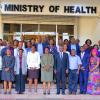NHLDS Rallies Private Sector to Combat Antimicrobial Resistance (AMR)
19th MAR 2025 - Kampala, Uganda The Ministry of Health (MoH), through the National Health Laboratory and Diagnostic Services (NHLDS), has engaged private sector health facilities in an effort to combat Antimicrobial Resistance (AMR) in Uganda. The virtual meeting was officially opened by the Acting Director General of Health Services, Dr. Charles Olaro who emphasized the need for a strong public-private partnership to tackle this growing public health threat.
“There has been concern over the under utilisation of micro biology testing and under reporting and we need to address this. National surveillance data on AMR if not shared remains incomplete and the government will continue to invest in therapeutics that are not effective” Dr Charles appealed.
He further highlighted the importance of collective action to improve the health of Ugandans by sharing data and leveraging the strengths of both government and private institutions.
The Commissioner NHLDS, Dr. Susan Nabadda, underscored the role private health facilities play in the battle against AMR.
"Private health facilities are often the first point of contact for patients, especially in urban areas, and are major users of antimicrobials. Their participation in AMR surveillance will result in more comprehensive data on antimicrobial use and resistance trends, better geographical and demographic coverage, and the inclusion of non-public data sources in national and global surveillance systems," she explained.
Dr. Nabadda also noted that private sector facilities stand to benefit from MoH stewardship and mentorship, which will enhance accuracy in testing, enable early resistance detection, and improve response strategies.
According to data from the NHLDS Microbiology Reference Laboratory, antibiotic resistance is the most common form of AMR, contributing to over 5 million deaths globally. Multi-drug-resistant tuberculosis (TB), for instance, increases the cost of care by up to nine times compared to drug-susceptible TB infections.
Dr. Saudah Namubiru Kizito a clinical Microbiologist at NHLDS outlined the main contributors to AMR including; overprescription of antibiotics, patients failing to complete treatments, excessive use of antibiotics in livestock and fish farming, poor infection control in healthcare facilities, inadequate hygiene and sanitation, and the slow development of new antibiotics.
"This collaboration strengthens the public-private response to AMR. Facilities that participate will benefit from government recognition, which will enhance their credibility, open doors for research and funding opportunities, and provide access to external quality assurance (EQA) programs and mentorship from national AMR experts," Dr. Saudah added.
Private health sector representatives welcomed the Ministry of Health's initiative and committed to supporting government-led efforts to improve public health.
"It’s encouraging to see the Ministry reach out for the Collaboration to ensure everyone benefits. However, just like during COVID-19, there is a need for the Ministry to establish minimum standards for laboratory facilities to guarantee reliable AMR results," said Dr. Freddie Bwanga from Makerere University cautioned.
“I would like to appreciate government efforts towards AMR beyond the talk. It’s ideal for every key player to be part. Self medication among the corporates in urban centres is high and only show up to health facilities if there is no improvement,” Brian -Mild May Uganda.
“There is need for government to develop a list of drugs not to be issued at the counter as a means to carb AMR,” Elizabeth Nampewo appealed.
Uganda’s private health sector comprises over 4,000 health facilities, 10,000 drug shops and pharmacies, and 2,000 diagnostic units and standalone medical centres. In the Kampala Metropolitan area alone, over 94% of health facilities are privately owned, making public-private collaboration essential in combating AMR and safeguarding public health.




